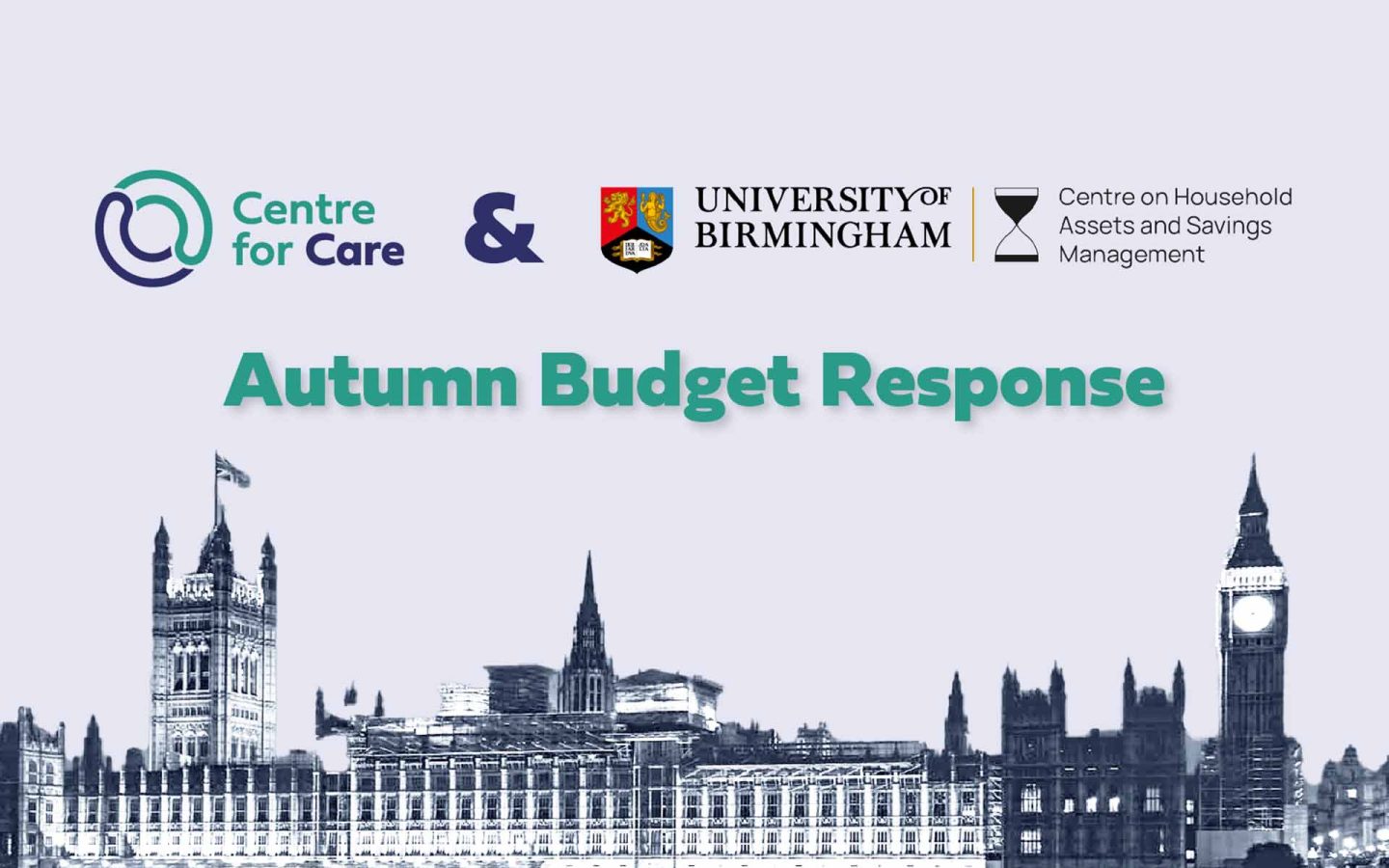Following extensive media briefings, the Autumn Budget statement, delivered by Chancellor Rachel Reeves on 26 November 2025, was a defining moment for this government’s economic strategy. With a budget shortfall estimated at between £20 billion and £40 billion, the Chancellor’s statement was always going to be an attempt to balance the competing pressures of self-imposed fiscal rules, growth ambitions, and the increasing need for investment in public services. In this context, the decision to remove the two-child benefit cap that could lift 350,000 children out of poverty came as a welcome (though not unexpected) announcement. For those who provide or receive care, however, the budget offered no such measures to celebrate. As Ed Davey noted in Parliament on the day of the Autumn Budget:
There was little for carers in this budget… carers who keep our NHS going, carers who keep our society going. They deserve far more support from their government
Ed Davey, House of Commons Chamber, 26.11.25.
His comments reflect the deep frustration shared by many, that unpaid carers remain overlooked despite their vital contributions. High living costs continue to erode already fragile household budgets, while the demands of caring intensify as health and social care systems strain under pressure. Without additional financial support or investment in social and respite services, carers face heightened risk of burnout, increased isolation and increasing financial strain.
While this week’s Carers Allowance Review has been welcomed, it was disappointing that the Chancellor offered no new policy measures specifically targeted at carers, nor any further reforms to Carer’s Allowance or the related system of financial and social support. The Centre for Care had been cautiously optimistic that the government might build on last year’s modest but important step of raising the Carer’s Allowance weekly earnings threshold from £151 to £196 from April 2025; a policy change that has given many carers the ability to earn a little more without losing vital financial support. The absence of new measures will represent a profound disappointment to the millions of people who provide unpaid care for loved ones across the UK.
A new social contract for unpaid carers
The Centre for Care has previously called for a new social contract for unpaid carers, with a national carers strategy to include long term, sustainable investment to address the crisis in access to social care, and support for carers’ incomes and financial wellbeing. Even modest interventions could have included a further increase in the Carers Allowance earnings threshold, a taper system to prevent sudden loss of entitlement, or recognition of carers within broader cost-of-living measures. None of these materialised.
Any new social contract must also recognise that disabled people are at the sharpest edge of the cost-of-living crisis. Disabled households face some of the highest rates of poverty in the UK, and need substantially more financial support to afford the same standard of living as non-disabled households. Higher energy costs, the need to run medical equipment, and the cost of accessible transport, mean that disabled people face extra unavoidable expenses. Cold homes and inadequate nutrition worsen health conditions and increase long-term healthcare costs, creating a vicious cycle of deprivation that seems to have no end. Yet many disabled people report having to choose between heating, food or running essential medical equipment, or relying on food banks to survive; recent survey data suggests that 64% are making these impossible choices, and 68% say financial pressure is harming their mental health.
Invisible again
Despite this, for disabled people in the UK, many of whom are unpaid carers themselves, the budget offered almost no recognition for potential support. The budget contains no targeted measures to address rising food and energy poverty, or commitments to safeguard schemes that disabled people rely on to travel to medical appointments and to remain independent.
At the same time, proposed reforms to Personal Independence Payment (PIP) – which remain paused rather than abandoned – and the Motability scheme threaten to strip away vital support; they risk making accessible transport unaffordable, deepening isolation, and undermining disabled people’s ability to work, care or even meet basic needs. A genuinely inclusive social contract must protect disability benefits, guarantee accessible transport, and ensure disability and carer voices are central to reform. Instead, the budget provided no targeted support to help disabled households keep warm, stay mobile or power essential equipment.
In the end, the Autumn Budget 2025 will have left disabled people and unpaid carers feeling invisible and unheard once again. Unpaid carers will undoubtedly continue to shoulder their responsibilities with resilience and compassion. Yet the lack of recognition in this budget fails to reform a social care system that depends on unpaid labour while offering little in return. The Chancellor made a political decision to prioritise what she believes will deliver growth, rather than focusing on the broader health and wellbeing of the citizens in this country.
Rachel Reeves may argue that hard choices had to be made, but the cost of overlooking carers will be measured not just in economic terms, but in the health, well-being, and dignity of those who provide, and those who rely on, unpaid care. A fair budget would recognise that disabled people and unpaid carers are central to the social and economic fabric of the UK. Neglecting them is not just a policy omission, it is a political choice that undermines any commitment to social justice.
About the authors
Maxine has an interest in human development, behaviour and the decisions that people make across a life span. In particular she is interested in the key influences on decisions that people make in relation to their personal and professional lives. She is currently working on a project that takes a life course approach to explore the economic impact of unpaid/family caring.
Charlie Grosset is a PhD student at the University of Sheffield, researching Critical Disability Studies, Social Policy, and Care.
They completed a BA in Sociology and an MA in Social Research Methodology at the University of Sheffield in 2021, followed by two years at the social research company ‘Substance,’ where they worked on a range of projects using methods such as co-production and Social Return on Investment. Their PhD explores the experiences of disabled people who are family carers, using biographical life interviews and creative qualitative methods to highlight disabled people’s care work, interdependent care, and the impact of austerity and ableist social care systems.






